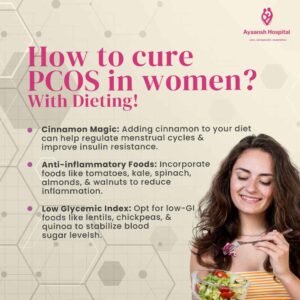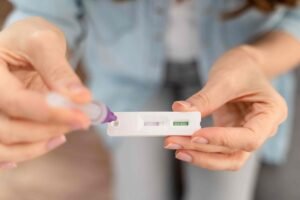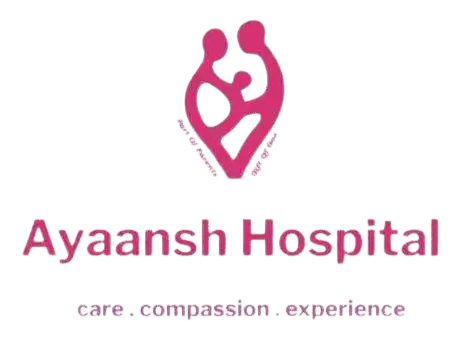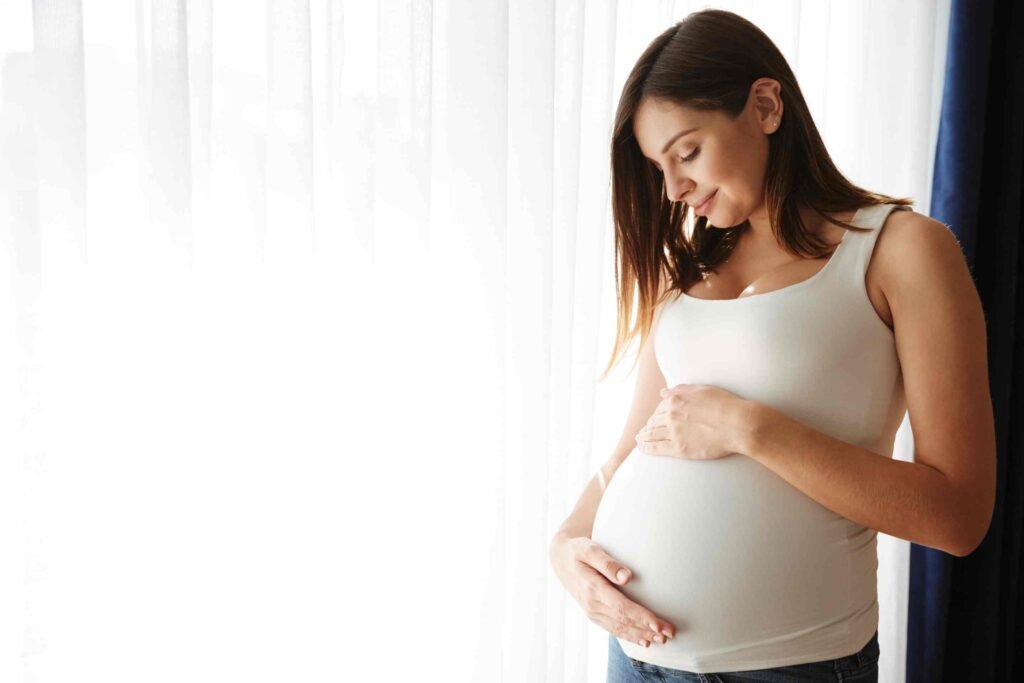What to Expect in the First Trimester of IVF Pregnancy
What to Expect in the First Trimester of IVF Pregnancy?
The journey of IVF (In Vitro Fertilization) pregnancy is unique, filled with moments of excitement, anticipation, and, understandably, some nervousness. If you’re stepping into this process or currently experiencing an IVF pregnancy, there are likely many questions you want answers to. What does the first trimester look like in an IVF pregnancy? How is it different from a natural pregnancy? And, most importantly, what should you expect during these initial, often crucial, weeks?
Let’s dive into the rollercoaster that is the first trimester of a pregnancy achieved through an IVF treatment in Bangalore, giving you a clear understanding of what to expect, what’s normal, and when you might want to reach out for extra support.

Understanding IVF Pregnancy
First things first, let’s start with a quick overview of what an IVF pregnancy is. IVF, or in vitro fertilization, is a fertility treatment where eggs are collected from a woman’s ovaries and fertilized by sperm in a lab. Once fertilized, the embryo(s) are transferred to the woman’s uterus in hopes that they implant and develop into a healthy pregnancy.
In IVF pregnancy, there’s a little more control over the process, and it’s a carefully monitored and structured experience. Your fertility team will guide you from egg retrieval to embryo transfer, and, if all goes well, you’ll soon enter the first trimester of pregnancy. This brings us to the burning question: what happens in those first 12 weeks?
The First Steps After a Positive IVF Pregnancy Test
Once your embryo transfer is complete, the waiting game begins. Pregnancies achieved through an IVF treatment come with a more structured approach to confirming pregnancy, usually via blood tests. This is often called the “two-week wait” because it’s around this time you’ll take your blood test (known as the beta hCG test) to check if the embryo has successfully implanted.
After receiving that long-awaited positive result, the real journey begins. But let’s be honest: getting a positive test result after IVF often feels different than with a natural pregnancy. There’s excitement, but also a certain level of cautious optimism, as you may still be processing the challenges of infertility. Many women describe feeling anxious about every little symptom (or lack of symptoms), wondering if everything is progressing as it should.
But don’t worry—this is totally normal. Let’s go through the specifics of what you can expect during the first trimester of IVF pregnancy.
Symptoms to Expect in the First Trimester of IVF Pregnancy
Just like with any pregnancy, the first trimester of an IVF pregnancy is filled with a wide range of physical and emotional symptoms. These can vary widely from woman to woman, and every IVF pregnancy is unique. However, here are some of the most common experiences:
1. Morning Sickness
Nausea and vomiting, often referred to as morning sickness, are classic symptoms that may show up around the sixth week of pregnancy. While the name implies that it happens only in the morning, nausea can strike at any time of day or night. It’s worth noting that IVF pregnancies are not immune to this joy (or lack thereof), and some women may experience stronger symptoms due to hormone medications used during IVF.
For many women, morning sickness lasts through the first trimester, but by around week 12 to 14, it typically begins to subside.

2. Fatigue
Pregnancy is exhausting—literally. One of the most common early symptoms of pregnancy is fatigue, and IVF pregnancies are no exception. Your body’s working overtime to create and support a new life, which requires a lot of energy. Combine that with fluctuating hormone levels, and it’s no wonder so many women feel utterly drained in these early weeks.
3. Breast Tenderness
Tender or swollen breasts are often one of the earliest signs of pregnancy, and many women going through IVF pregnancy may notice this even before they get their positive pregnancy test. The hormone medications used during IVF can sometimes amplify this symptom.
4. Spotting and Cramping
Spotting, or light bleeding, and mild cramping can be alarming, but they are not uncommon in early pregnancy, whether IVF or natural. This can happen as the embryo implants into the uterine lining, which is a process that sometimes causes spotting (often referred to as implantation bleeding).
It’s important to remember that spotting and cramping do not always indicate a problem. However, if you experience heavy bleeding or intense cramps, it’s always a good idea to reach out to your fertility clinic or OB-GYN to get checked out.
5. Mood Swings
Hormones, stress, excitement, and anxiety are all at play during the first trimester of any pregnancy, but with IVF pregnancies, the emotional highs and lows may feel more intense. Mood swings, crying over seemingly small things, and feeling both elated and scared are very common.

6. Frequent Urination
Increased hormone levels can lead to frequent urination, even in the first trimester. The growing uterus puts pressure on your bladder, causing you to make more trips to the bathroom. While this symptom is more noticeable later in pregnancy, it can also occur early on due to hormone changes.
7. Bloating and Gas
Hormones can slow down your digestive system, causing you to feel bloated or gassy during early pregnancy. Many IVF medications can also exacerbate this, making you feel uncomfortable in your own skin. Drinking plenty of water, eating fiber-rich foods, and avoiding carbonated beverages can help ease some of the discomfort.
8. Absence of Symptoms
Here’s a curveball: not experiencing typical pregnancy symptoms can also be perfectly normal in an IVF pregnancy. While it can make you worry, especially after everything you’ve been through, the absence of symptoms doesn’t necessarily mean something is wrong. Some women don’t experience many symptoms in early pregnancy, and everything proceeds just fine.
IVF Pregnancy Monitoring: It’s Different from a Natural Pregnancy
One of the major differences between IVF pregnancy and a natural pregnancy in the first trimester is the level of monitoring. Because IVF pregnancies are often considered higher risk, your fertility clinic will typically keep a close eye on you. This means you’ll likely have more frequent checkups, ultrasounds, and blood tests during your first trimester than someone with a naturally conceived pregnancy.
1. Regular Beta hCG Testing
In a natural pregnancy, most women take a home pregnancy test and then go to their first OB appointment around 8–10 weeks. In an IVF pregnancy, you’re likely to have a more detailed follow-up right from the start. After your first positive pregnancy test (beta hCG), you’ll typically have repeated blood tests every few days to confirm that your hormone levels are rising appropriately.

2. Early Ultrasounds
Around 6–7 weeks into your IVF pregnancy, you’ll usually have your first ultrasound. This is an exciting and nerve-wracking moment! The early ultrasound is done to confirm the pregnancy, check for a heartbeat, and ensure the embryo is developing normally. If you’re pregnant with multiples, which is more common in IVF pregnancies, this is usually when you’ll find out.
Additional ultrasounds may follow in the coming weeks, depending on your fertility clinic’s protocol and how your pregnancy is progressing.
3. Monitoring for OHSS
Ovarian hyperstimulation syndrome (OHSS) is a condition that can sometimes develop after the egg retrieval process in IVF. While most cases are mild, it’s something your doctor will monitor for, as symptoms can carry into early pregnancy. OHSS symptoms include bloating, nausea, and abdominal pain, and if left untreated, severe cases can lead to complications.
4. Progesterone and Other Medications
Unlike in natural pregnancies, where hormone production takes over naturally after conception, IVF pregnancies often require a little help. Progesterone is one of the key hormones your body needs to support early pregnancy, and in IVF pregnancies, supplemental progesterone is often prescribed. You may be taking it in the form of injections, vaginal suppositories, or oral tablets. It’s essential to continue this medication until your doctor says otherwise, as stopping too early could impact the pregnancy.
Emotional Considerations During IVF Pregnancy’s First Trimester
While the physical symptoms are certainly important, the emotional rollercoaster of an IVF pregnancy can sometimes be even more intense. You’ve already been through a lot to get here, and now, with pregnancy confirmed, new anxieties and emotions often arise.
1. Fear of Miscarriage
It’s completely natural to worry about miscarriage, especially during the first trimester of an IVF pregnancy. Many women going through IVF feel a heightened sense of vulnerability, and the thought of something going wrong can sometimes overshadow the joy of pregnancy. Try to take things one day at a time and lean on your support system when you’re feeling anxious.
2. Grief and Joy Simultaneously
Many women going through IVF have faced infertility, and the emotional weight of that journey can linger even after pregnancy is achieved. You may feel a mixture of joy, relief, and even grief for the hardships you faced getting to this point. It’s important to honor all these emotions and remember that it’s okay to feel conflicted, even in the face of good news.
3. Seeking Support
Going through IVF pregnancy can feel isolating, especially if others in your life haven’t experienced it. Finding a supportive community, whether online or in person, can help you navigate the ups and downs. Connecting with other women who have gone through IVF can be a source of comfort and reassurance.

Navigating the Rest of the First Trimester in IVF Pregnancy
As the weeks tick by, your first trimester will eventually give way to the second. The good news is that many women begin to feel better as they approach the end of their first trimester. By around week 12, many of the more challenging symptoms like nausea and fatigue often begin to ease, giving way to a new phase of pregnancy.


